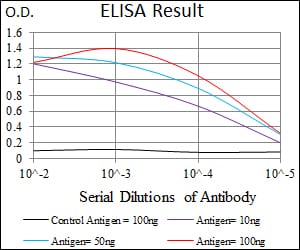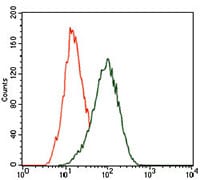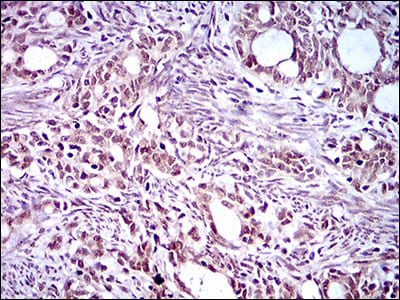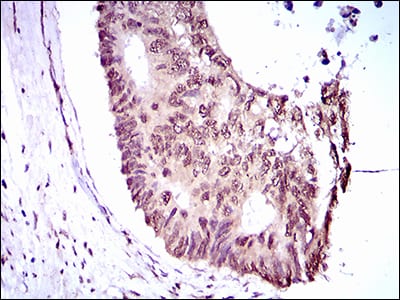



| WB | 咨询技术 | Human,Mouse,Rat |
| IF | 咨询技术 | Human,Mouse,Rat |
| IHC | 1/200 - 1/1000 | Human,Mouse,Rat |
| ICC | 技术咨询 | Human,Mouse,Rat |
| FCM | 1/200 - 1/400 | Human,Mouse,Rat |
| Elisa | 1/10000 | Human,Mouse,Rat |
| Aliases | EKLF; INLU; HBFQTL6 |
| Entrez GeneID | 10661 |
| clone | 1B6A3 |
| WB Predicted band size | 38.2kDa |
| Host/Isotype | Mouse IgG1 |
| Antibody Type | Primary antibody |
| Storage | Store at 4°C short term. Aliquot and store at -20°C long term. Avoid freeze/thaw cycles. |
| Species Reactivity | Human |
| Immunogen | Purified recombinant fragment of human KLF1 (AA: 208-362) expressed in E. Coli. |
| Formulation | Purified antibody in PBS with 0.05% sodium azide |
+ +
以下是与KLF1抗体相关的3篇参考文献及其摘要概括:
1. **文献名称**:*Krüppel-like factor 1 (KLF1) mutations in moderate and severe hereditary persistence of fetal hemoglobin*
**作者**:Bianchi, E., et al.
**摘要**:研究分析了KLF1基因突变对胎儿血红蛋白(HbF)表达的调控作用,利用KLF1抗体进行染色质免疫沉淀(ChIP)实验,揭示KLF1直接结合在γ-珠蛋白基因启动子区域,突变导致成年期HbF异常升高。
2. **文献名称**:*KLF1 directly coordinates activation of embryonic and fetal globin genes in human erythroid cells*
**作者**:Tallack, M. R., et al.
**摘要**:通过KLF1抗体的Western blot和免疫荧光技术,研究证实KLF1在红系细胞中同时调控胚胎和胎儿珠蛋白基因的激活,揭示其通过结合特定DNA序列协调发育阶段特异性血红蛋白转换的机制。
3. **文献名称**:*A cell-selective knockout of the erythroid transcription factor KLF1*
**作者**:Pilon, A. M., et al.
**摘要**:利用KLF1抗体在小鼠模型中验证组织特异性敲除效果,发现KLF1缺失导致红细胞成熟障碍和贫血,证明其在红系分化中的关键作用及对靶基因(如Bcl11a)的调控网络。
这些文献均通过KLF1抗体开展功能或机制研究,涉及基因调控、疾病模型及血红蛋白合成的分子机制。
KLF1 (Krüppel-like factor 1), also known as Erythroid Krüppel-like Factor (EKLF), is a transcription factor critical for regulating erythroid (red blood cell) development and differentiation. It belongs to the Krüppel-like family of zinc finger proteins and plays a pivotal role in activating genes involved in hemoglobin synthesis, erythroid maturation, and cell cycle regulation. KLF1 binds to specific DNA sequences, such as the CACCC box in the β-globin gene promoter, to drive expression of adult β-globin and other erythroid-specific genes.
KLF1 antibodies are essential tools for studying its function in hematopoiesis and related disorders. Researchers use these antibodies in techniques like Western blotting, immunofluorescence, chromatin immunoprecipitation (ChIP), and flow cytometry to detect KLF1 expression, localization, and DNA-binding activity. KLF1 mutations or dysregulation are linked to congenital anemias (e.g., CDA-IV), hereditary persistence of fetal hemoglobin (HPFH), and platelet abnormalities, making its antibodies valuable for diagnosing or modeling such conditions. Additionally, KLF1 antibodies aid in exploring its interactions with co-regulators (e.g., GATA1) and its role in stress erythropoiesis. Most KLF1 antibodies target conserved regions, such as the N-terminal transactivation domain or C-terminal zinc fingers, ensuring specificity across human and murine models. Their applications span basic research, clinical diagnostics, and therapeutic development for blood-related diseases.
×